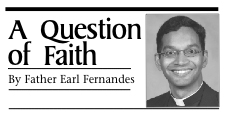Question of Faith: Would we be better off with no music during Communion Rite?

It is dangerous when beginning something new, such as this column, to enter an area as controversial as the sacred liturgy. I received the following question from a man from Dayton:
“The Eucharist is about intimacy with Christ. Would our hearts minds and souls be better served if music ministries would avoid loud intrusive music throughout the Communion Rite?”
The Eucharist is about intimacy. In the Eucharist, Christ communicates himself — body, blood, soul and divinity — to each of us. He gives himself to us and we receive Him — personally, fully, and intimately. Rightly is the Eucharist called the “sacrament of charity” and a “nuptial sacrament.” Nevertheless, intimacy is not the same thing as private. For example, marriage is a sacrament of intimacy, but it is not private; it involves a communion of persons. The Eucharist is the sacrament of the church and for the church. It is the cause and effect of Christian unity. To paraphrase the church Fathers, “The church makes the Eucharist, and the Eucharist makes the church.” Thus, the intimacy of eucharistic communion is personal and corporate.
Would our souls be better served if music ministries would avoid loud intrusive music throughout the communion rite?
It is hard to determine how well one’s soul would be served; that is up to God and our disposition to receive and cooperate with God’s grace. The liturgical reforms of the Second Vatican Council sought to encourage full, conscious, and active participation in the church’s liturgy. One touches upon entrance into the mysteries of the faith, searching for deeper meaning, and ultimately, communion with God. While some liturgical theologians would say that the whole liturgical assembly should be singing together and praying together as an outward sign of unity, church teaching on the liturgy speaks of active participation, not only as external participation, but also as interior participation. The real issue is whether the liturgical celebration is helping the faithful to achieve this deeper union with God and with each other.
One means of helping the faithful experience this deeper communion is music. The General Instruction of the Roman Missal (n. 87) gives four options for the Communion chant, which indicates the sense of sobriety of the Roman liturgy: (1) the antiphon from the Roman Missal or the psalm from the Roman Gradual as set to music; (2) the seasonal antiphon and Psalm of the Simple Gradual; (3) a song from another collection of psalms and antiphons approved by the bishops conference or the bishop; or (4) a suitable liturgical song, either sung by the choir or with the people.
From the Instruction, the church’s preference for chant and the use of the antiphons and psalms for the liturgical season appears. Unfortunately, in many parishes option four is used exclusively and much of the beautiful music from the church’s liturgical tradition has been neglected. One must also acknowledge the dearth of well-trained liturgical ministers and how it would be difficult to sing some of the chants, antiphons and graduals without proper training.
Loud and intrusive. What is loud and intrusive is somewhat subjective. For example, there were many beautiful liturgical pieces that had entered the Roman liturgy prior to the liturgical reforms of St. Pius X at the start of the 20th century. While these were beautiful, they often prolonged the liturgy and made the faithful spectators at the liturgy. Thus, Pius X wished to restore participation in the liturgy to the faithful encouraging the singing of Gregorian chant, which continues to hold pride of place in the Roman Church. In Sacramentum Caritatis (n. 42) Pope Benedict comments: “In the course of her 2,000 year history, the church has created, and still creates, music and songs which represent a rich patrimony of faith and love. This heritage must not be lost. Certainly as far as liturgy is concerned, we cannot say that one song is as good as another. Generic improvisation or the introduction of musical genres which fail to represent the meaning of the liturgy should be avoided.”
The underlying concern of the question is a sense of reverence and contemplation during the liturgy, which might be helped by a period of silence after Communion. It is never easy for a pastor or music director to keep everyone happy, yet a greater understanding of and application of the church’s liturgical norms and theology can help everyone more deeply experience the great sacrament of God’s love.
+ + + + + +
Father Earl Fernandes is dean of Mount St. Mary’s Seminary and the Athenaeum of Ohio, where he is assistant professor of moral theology. To ask Father Fernandes a question about the Catholic faith, send an email to [email protected] or to The Catholic Telegraph, 100 East Eighth Street, Cincinnati, OH 45202.













